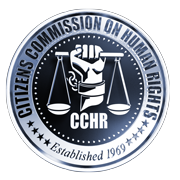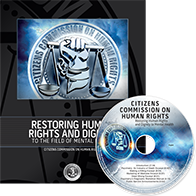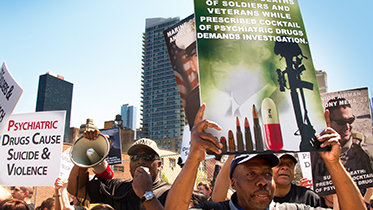OPTIONS & ALTERNATIVES
Psychiatrists will not tell you that there are many safe and effective, non-psychiatric options for mental and emotional turmoil.
While life is full of problems, and those problems can sometimes be overwhelming, it is important to know that psychiatry, with its unscientific diagnoses and harmful treatments, are the wrong way to go. Their most common treatment, psychiatric drugs, only chemically mask problems and symptoms; they cannot and never will be able to solve life’s problems. Once the drug has worn off, the original problem remains, or may even deteriorate. Though psychiatrists classify their drugs as a solution to life’s problems, in the long run, they only make things worse.
One real solution is first to become better informed about the risks of psychiatric treatment, especially drugs. For information about side effects, log onto www.cchrint.org/psychdrugdangers.
So if psychiatric treatment isn’t the answer, what is?
According to top experts, the majority of people having mental problems are actually suffering from non-psychiatric disorders, which can cause emotional stress.
You can get a thorough physical examination from a competent medical—not a psychiatric—doctor to check for any underlying injury or illness that may be causing emotional distress.
It’s up to you to insist on it—after all, it’s your health at stake. If your doctor cannot or is unwilling to perform such an exam, have him refer you to someone who can.
As neurologist Prof. Malcolm Hooper, Chief Scientific Adviser to the British Gulf Veterans Association, advises: “Every physical symptom, every symptom should be investigated for physical origins before you go into psychiatry. And, because, if you don’t do that, almost certainly, someone who has a real physical symptom, is being labeled as having a psychiatric symptom, which is a false.”
If you want to get yourself off of psychiatric drugs, it is very important to do so under the supervision of a qualified, competent medical practitioner.
Link to Alternatives: http://www.cchrint.org/alternatives/
A sample of quotes from military experts about seeking non-psychiatric support includes the following:
- “The main word for soldiers, and not only soldiers but anybody suffering from any type of so-called mental illness, is that there's hope. That there's hope out there. There are solutions out there. Things are available for you to get your life back. To not have suicidal thoughts. To not end your life. But to gain your life back. To cleanse your body. To be the person you used to be. There's always a solution to every situation and it's out there if you search for it. And it does not include psychiatric drugs.” – Dr. Edward F. Group III, Founder and CEO, Global Healing Center, Former Army Infantry
- “I want these troops to know that there are people that do care. And I want them to know that we are continuing to say the truth regarding these drugs and to say it needs to stop. They need to be treated appropriately. And they need to be treated as human beings, no experimentation, and no abuse that has gone on from the psychiatric community in this fashion. I want to see these troops given the respect that they deserve and they deserve it so very much.” – Joyce Riley, Registered Nurse, Served as a Captain in the USAF in support of Operation Desert Storm
- “To the soldiers that are still serving, before you put any medication in your mouth, read the literature, read the side effects. And know that it’s probably not the answer, that it’s going to help prevent something that you need to do, which is process and love the people that are around you and receive that love and try to share it to your fellow soldiers.” – Joel Kort, Former Marine Infantry NCO Corporal & Army Combat Medic NCO
- “So, what is the solution? Get rid of psychiatry in mental health. Don’t leave them in charge…Why hasn’t psychiatry been relieved of command? Fired. Thrown out of the military? Anybody else, any private company that continues to fail, the leadership will go.” – Bart Billings, Ph.D., Retired Col. and Former Military Psychologist












